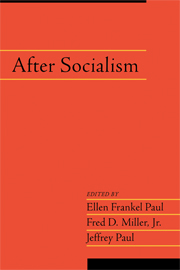Book contents
- Frontmatter
- Contents
- Introduction
- Acknowledgments
- Contributors
- Can There Be an “After Socialism”?
- The Cultural Contradictions of Socialism
- The Idol of History
- Backwards into the Future: Neorepublicanism as a Postsocialist Critique of Market Society
- What's Left of the Welfare State?
- The Roots and Rationale of Social Democracy
- An Interpretation and Defense of the Socialist Principle of Distribution
- Some Feasible Alternatives to Conventional Capitalism
- After Socialism: Mutualism and a Progressive Market Strategy
- Sovereignty, Commerce, and Cosmopolitanism: Lessons from Early America for the Future of the World
- Beyond Fear and Greed?
- Liberalism's Divide, After Socialism and Before
- INDEX
An Interpretation and Defense of the Socialist Principle of Distribution
Published online by Cambridge University Press: 01 June 2010
- Frontmatter
- Contents
- Introduction
- Acknowledgments
- Contributors
- Can There Be an “After Socialism”?
- The Cultural Contradictions of Socialism
- The Idol of History
- Backwards into the Future: Neorepublicanism as a Postsocialist Critique of Market Society
- What's Left of the Welfare State?
- The Roots and Rationale of Social Democracy
- An Interpretation and Defense of the Socialist Principle of Distribution
- Some Feasible Alternatives to Conventional Capitalism
- After Socialism: Mutualism and a Progressive Market Strategy
- Sovereignty, Commerce, and Cosmopolitanism: Lessons from Early America for the Future of the World
- Beyond Fear and Greed?
- Liberalism's Divide, After Socialism and Before
- INDEX
Summary
INTRODUCTION
For this collection entitled “After Socialism,” we were asked to reflect upon such questions as what rectifications (if any) to present market capitalist systems might be desirable and whether there is any viable remnant in the socialist ideal that ought to be preserved. My basic answer to the latter is that the socialist principle of distribution “From each according to abilities, to each according to needs” remains a compelling moral ideal, superior to the resigned, complacent, or enthusiastic acceptance of economic inequality that is offered by defenders of conventional capitalism and by many versions of liberalism. And so, my answer to the former is that the rectifications to present market capitalist systems that would be desirable would be to reduce the deep injustices and social malformations of these systems as much as possible by moving their distributive outcomes in the direction of the socialist ideal.
To avoid any misunderstanding, let me make clear at the outset that I do not think that this socialist ideal either requires or ought to be pursued through the central economic planning and authoritarian politics that were characteristic of the state socialist systems that have now collapsed. Moreover, I think that the socialist ideal is compatible with a deep commitment to individual freedom, and I shall defend this view in the course of my argument. I also think that it is a mistake, both analytically and empirically, to regard market capitalism as a single, invariant form.
- Type
- Chapter
- Information
- After Socialism , pp. 145 - 177Publisher: Cambridge University PressPrint publication year: 2003
- 1
- Cited by



